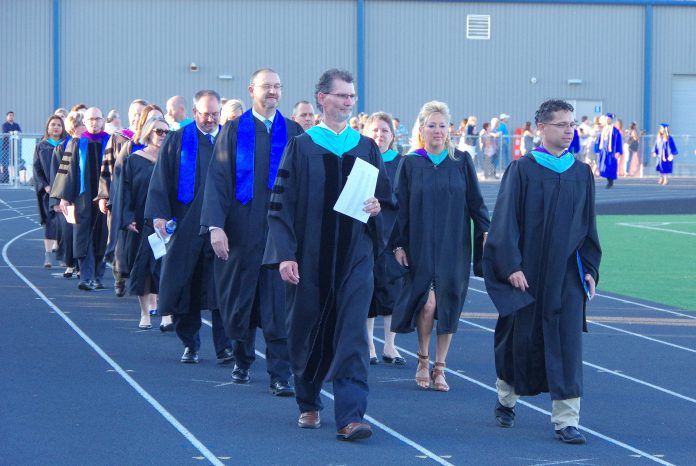
Baker to step down on June 30, 2023 after 30 years in education, five years in top job
CARTHAGE, Mo. — In an announcement that took some by surprise, Carthage School Superintendent Mark Baker announced his decision to retire at the end of the school district’s fiscal year, June 30, 2023.
Baker has been an educator for 30 years, and served as Carthage’s superintendent for five years.
“With emotions ranging from sadness to happiness to anxiousness to relief, but eventually I know I will experience joy, I am announcing my retirement effective June 30, 2023,” Baker said in a written statement posted to the Carthage R-9 District’s Facebook page. “It is hard to believe that around 30 years ago this month, I was hired to be part of the Tigers family. I’ve been blessed to work alongside people who truly care about all students performing to the best of their abilities. Experiencing the support only the Carthage community can provide has been uplifting. Most importantly, we have great children in Carthage. It has been my honor to serve the children, staff and Carthage Community as a teacher, coach and administrator.”
Baker background
Baker’s first job after graduating from what was then Missouri Southern State College in Joplin in the fall of 1992 was as a history teacher at the Carthage Junior High School. He also coached baseball, was the district’s first softball head coach and was an assistant coach when the district started its swimming program.
The Webb City High School graduate and Carterville native, then moved to Carl Junction where he became the high school assistant principal in 1996 and an assistant superintendent in 2000.
In 2002, then Carthage Superintendent Dr. Gary Reed hired Baker to be the Carthage Assistant Superintendent for Business, a position he would hold for 15 years before succeeding Dr. Sean Smith as Carthage Superintendent in 2017.
“I owe a lot to (former Carthage Superintendent) Dr. Gary Reed,” Baker said. “He hired me as a teacher and encouraged me to be an administrator. We worked on our doctorate together, and he hired me as Carthage Assistant Superintendent. I also greatly appreciate the leadership opportunities Mrs. Pam George, Carl Junction High School principal, provided me. She took a chance on a 26 year old teacher and coach to be an administrator.”
Baker noted that his entire educational career was spent in Jasper County.
“I love this area, I grew up in the area, grew up in Carterville, graduated from Webb City,” he said. “It’s hard to beat Southwest Missouri’s values and there was no reason to leave this area because I believe in what this area teaches and what our belief system is.”
Baker said he’ll miss the relationships he’s built with school board members, the district’s staff, the community and students, but there are things he won’t miss about the job, such as the calls on whether or not to have school when winter weather hits.
“That is definitely one thing I will not miss, and my family will not miss, me getting up at 3 o’clock in the morning and driving on ice and snow,” Baker said. “That will be a big relief. It’s pretty crazy, you’re driving in the snow and ice trying to see if you can wreck, but we need to do that.”
He said he hasn’t decided what’s next in his life.
“Nothing has been determined yet on my future after June 30, 2023. I know I’ll have to do something,” Baker said. I’m not the type of person to just sit around. I just know that all the stress as superintendent needed to be removed from my life and this is just the perfect time to do it. It was very difficult to make a decision that the only thing you’ve known for 30-plus years, you decide not to do anymore. But I felt through prayers and discussions with other people that it was the right thing to do and I’m at peace with the decision.”
Board president reacts
Carthage R-9 Board President Niki Cloud said she was surprised by Baker’s announcement at the board meeting on Monday, but she also understands it.
“I thought, man, this is really the hardest job ever,” Cloud said. “He’s had 30 years in education, he’s got his 30 years in. I was really hoping he’d stay around a little longer because he’s fantastic, but I can see why he’s retiring.”
Cloud credited Baker with guiding the district through the COVID-19 pandemic, probably the most significant challenge to education in decades.
“I’m a single mom with two kids who were like, oh hey, we’re home and you get to homeschool us in March of 2020,” Cloud said. “Everything changed. I saw it on the board’s side where we had to have board meetings by Zoom and try to figure out how are we going to still help educate, especially with the diversity of our student population. Not everybody has the luxury of having a parent who works from home to now help homeschool and good internet and there will be food, things like that. Working with Dr. Baker during that time I really feel that through everything, COVID and everything, he’s always kept children’s best interests at heart.”
She also credited him with responding to the growth in student population the district has seen over the past decade and a half.
“I think one of his biggest accomplishments is managing the changes over the last 10 years in that our population has increased and we now employ 800 people in the district,” Cloud said. “Watching the growth in this district, he’s always said we are a destination district and he’s right on target with that. I think some of the biggest feathers in his cap will be look how much we’ve grown and how much we’ve succeeded.
Baker’s tenure includes major building changes
Carthage School Superintendent Mark Baker’s 20-year tenure as assistant superintendent for business and superintendent included the most extensive building program in the R-9 District’s history.
During his time as assistant superintendent for business, Baker was responsible for directly overseeing district construction and maintenance projects.
He said the program was necessary because of the rapid growth in the number of students attending school in Carthage from the 1990s until now.
“It’s scary to think what it would have been like today if our community did not have the wisdom to pass these bond issues,” Baker said. “We used to have over 700 kids at Steadley Elementary alone and it’s just crazy to think that we now only have kindergarten through third grade in that building that used to be kindergarten through sixth grade. We teach around 420 kids in that school now. It’s better for our facilities and better for our community as well.”
Over that time Baker said the district only asked for a property tax increase twice, once in 2006 to establish the debt service property tax levy and fund the current Carthage High School and once in 2015 when voters approved a 40-cent increase in the operating levy, which expires in 2025, to fund a new football stadium.
All other projects have been funded by voter-approved extensions of the 83-cent debt service levy or donations and grants from local trusts and the state and federal government.
The projects and bond issues approved and completed during Baker’s tenure:
- The field house and classroom addition to the Carthage Junior High, paid for primarily by donations in 2006.
- The new Carthage High School on South River Street completed in 2009 and paid for by a school bond issue in 2006 that set the district’s debt service property tax levy at 83 cents per $100 of assessed valuation.
- The South Technical Center was paid for with a 50/50 matching grant from the state of Missouri. The Steadley Trust provided the school district’s matching funds.
- The new David Haffner multi-purpose Stadium and Tiger Field house, paid for by a a 40-cent increase in the district’s general operating levy for 10 years and raise $10 million, approved by voters in 2015.
- The new tennis courts outside Haffner Stadium were funded primarily by the Steadley Trust.
- The new Carthage Intermediate Center, which now houses fourth and fifth grade students and was paid for by a bond issue approved by voters in 2014 and funded by an extension of the debt service levy.
- The complete gutting and remodeling of the Carthage Junior High School at Centennial and River streets, part of the 2014 bond issue.
- Reinforced tornado safe rooms, which also serve as additional classroom space, at all the elementary campuses, and funded by a one-time extra transfer of money from the district’s operating fund to its facility maintenance fund.
- The Carthage Early Childhood Center, built with federal money and local donations in 2015 to house the Carthage Parents as Teachers program, pre-kindergarten classes and early childhood special education classes.
- The Tiger Activity Center at Carthage High School was paid for with grants from the Steadley Trust, the McCune-Brooks Regional Hospital Trust Fund and donations.
- Expansion of the Carthage Technical Center south campus to double the size of that building and remodeling of the Technical Center’s north campus to house adult education programs, paid for by a bond issue approved by voters in 2020 that again extended the debt service levy.
The district also added three buildings by donations from other groups:
- The Carthage Bright Futures building at Grant and Chestnut was donated to the district by Access Family Health Care in 2013 for a symbolic $1.
- The former doctor’s office at 709 W. Central Avenue, that now houses the district administration and Beacon Autism Center, was donated to the district by the McCune-Brooks Healthcare Foundation for a symbolic $1 in 2017
- The current Powers Educational Center, housed in the former Powers Museum, was donated to the district in 2021.
Baker also helped manage two major realignments of the district’s grades.
The first was in 2010 when Carthage High School opened. Ninth through 12th grades move to the new high school, seventh and eight grades move to the historic Carthage High School at 704 S. Main St. turning that into the Carthage Junior High School, and fifth and sixth grades move out of the five elementary schools to the former junior high creating the new Carthage Middle School.
In 2014, voters approved an $18 million bond issue that extended the district’s 83-cent debt service property tax levy to build the Carthage Intermediate Center and remodel the Carthage Middle School, and triggered the second major realignment.
The Intermediate Center was finished in 2017 and the new junior high remodeling was finished in 2019 and included the district’s first public tornado shelter, funded in part by a grant from FEMA.
At the beginning of the 2020 school year, fourth and fifth grade students moved to the Intermediate Center, leaving the kindergarten through third grade classes in the elementary schools. The historic Carthage Junior High School became the Sixth Grade Center, and the former Middle School returned to its original name, Carthage Junior High and housed seventh and eighth grade classes.














